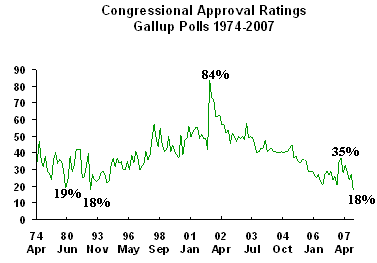Given liberal despair over President Obama's political fortunes, you might think that we live in a world where the Republican Party is popular with voters. But you'd be wrong. Despite their recent legislative success, Republicans have never been more unpopular than they are now. According to the latest CNN survey of American voters, 59 percent have an unfavorable view of the Republican Party, a record high in CNN’s polling. This is an eleven point jump from March, when CNN released its first poll of the new Republican House majority. Right now, the GOP is more unpopular than it was during Bill Clinton’s impeachment trial.
At the moment, this doesn't mean much for President Obama reelection chances. The next presidential election is more than a year away, and the unpopularity of a political party means less than how voters' feel about a given candidate. Indeed, given the poor economy, whoever Republicans nominate for the presidency will likely outperform the party's overrall popularity.
The situation is much worse for congressional Republicans. For the first time, according to CNN, most Americans don’t agree that their own member of Congess deserves reelection. Only 41 percent of those polled said that their lawmaker deserves another term, 49 percent disagreed. While this is at odds with a recent Gallup poll on the same question – 54 percent say that their lawmaker deserves reelection, as opposed to 34 percent who disagree – it is in line with polls that show deep disapproval with Congress. For instance, in the latest CBS/New York Times poll, a scant 14 percent of Americans approve of the way Congress is doing its job.
If the last twenty years is any indication, abysmal approval ratings for Congress suggests wave elections. Here is Gallup's plot of congressional approval ratings, from 1974 to 2007:
The lowest drop, in 1993, corresponds with the first major wave election of the contemporary era: in 1994, Democrats lost 54 seats in the House and 8 in the Senate. In 2006, low congressional approval led to a 36 seat loss for congressional Republicans, and in 2010, Congress’ 17 to 19 percent approval rating in October led to a 69 seat loss for congressional Democrats.
At this rate, it's possible that 2012 will see another wave, with Democrats either closing the gap with Republicans, or winning an outright majority.




